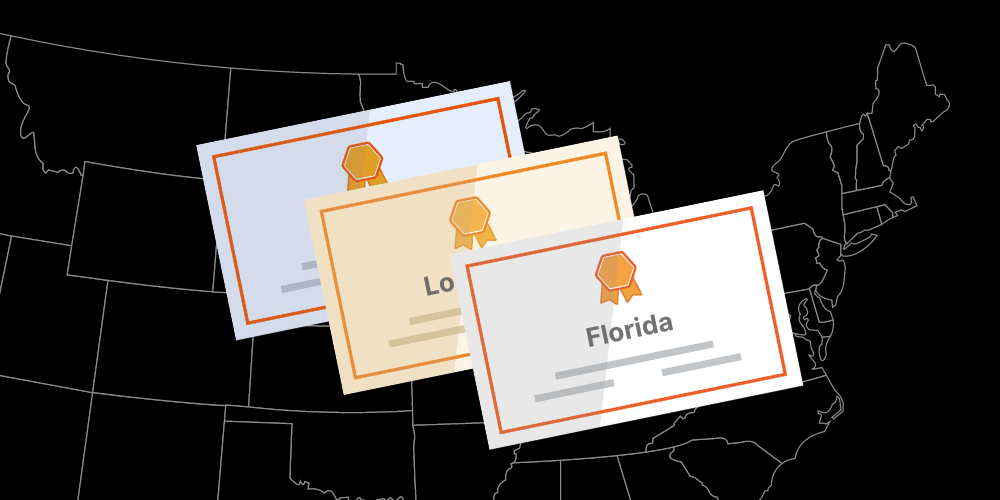— 5 min read
Idaho Contractor Licensing and Registration Guide
Last Updated Jun 11, 2024
Last Updated Jun 11, 2024

Idaho requires everyone who performs work as a contractor to be licensed with the Idaho Contractors Board. Only employees and companies working on projects of less than $2,000 are not required to be licensed.
Trade subcontractors (mechanical, electrical, plumbing) and construction managers are required to be licensed through the Division of Building Safety. In addition, any contractor that works on a public works project needs to be licensed through Building Safety.
Fire sprinkler contractors need to be licensed through the Department of Insurance State Fire Marshal. Any work that is done outside the scope of these specialty licenses requires the contractor to be licensed through the Contractors Board as well.
Read on for details about the Idaho contractor licensing process — and how you can get the license you need for your business.
Table of contents
How to get an Idaho general contractor license
Contractors who serve as general contractors or construction managers should apply for licensing at the Idaho Contractors Board.
The process for getting licensed is quick and easy. The contractor must fill out a form, get it signed and notarized, then mail or deliver the original notarized form, along with a copy of their photo ID, the application fee of $50, and proof of general liability and workers' insurance, to the board. The state requires a minimum of $300,000 in general liability coverage for general contractors.
Veterans and active-duty military personnel, along with their spouses, are provided with expedited application processing and credit for their service.
Learn the rules in nearby states
Specialty contractor licensing and registration
Mechanical, plumbing, and electrical subcontractors need to register with the Division of Building Safety. Contractors or construction managers who want to work on public works projects must also register with the Division of Building Safety. Fire sprinkler subcontractors register with the Department of Insurance State Fire Marshal. We’ll go through the process for each one of these trade contractors.
Additionally, contractors and construction managers who want to work on public work projects costing over $10,000 need to be licensed through the Division of Building Safety.
Electrical contractors
Electrical contractors must employ at least one licensed master electrician.
The master electrician’s license application is found on the Division of Building Safety website. The contractor must submit a completed application, pay a $15 application fee, and take an exam in order to be licensed.
Once they pass the exam, they are required to turn in a certificate of insurance for general liability and workers comp insurance and a $125 licensing fee. The state requires at least $300,000 in general liability insurance coverage for electrical contractors.
Idaho honors journeyman electrician licenses from the following states: Colorado, Maine, Montana, Nebraska, New Hampshire, New Mexico, North Dakota, Oklahoma, Oregon, South Dakota, Texas, and Wyoming (includes master electrician license).
HVAC and mechanical contractors
HVAC and mechanical contractors also must employ at least one journeyman technician. The application for an HVAC technician can be found on the Division of Building Safety website.
The contractor must submit a completed application, a $35 application fee, and take an exam in order to be licensed. The application includes a verification of experience that must be completed by someone other than the applicant. Once the applicant has passed the exam, they must submit a $2,000 bond and the licensing fee, which isn’t specified.
Courses about construction.
For construction.
Unlock your career potential with our free educational courses on Health & Safety, Data in Construction, and more.
Plumbing contractors
Plumbing contractors must employ at least one journeyman plumber. The application for a plumber license can be found on the Division of Building Safety website. The contractor must submit a completed application, a $22.50 application fee, and take an exam in order to be licensed.
The application includes a verification of experience that must be completed by someone other than the applicant. Once the applicant has passed the exam, they must submit a $2,000 bond and the licensing fee, which isn’t specified.
Idaho honors journeyman plumbing licenses from the following states: Montana, Oregon, and Washington.
Fire sprinkler contractors
Fire sprinkler contractors must be licensed through the Department of Insurance State Fire Marshal. The contractor must complete an application, pay a $400 application fee, and take an exam. Once the exam is passed, the contractor must submit a $2,000 bond and proof of general liability and workers comp insurance. The contractor must carry at least $250,000 in general liability insurance coverage.
Requirements for cities and municipalities
Before beginning work in Idaho, it’s best to check local jurisdictions to verify there are additional licenses required, whether they’re contractor’s licenses or business licenses. Requirements vary widely by location.
For example, the cities of Boise and Coeur d’Alene do not require contractors to be licensed. However, the city of Pocatello has 13 different contractor licenses that may be required depending on the type of work you are doing.
No matter where you live, it's always best to check your local municipality to make sure you're following all the licensing and registration rules and requirements to operate above-board and keep your payments protected.
Penalties for not being licensed
Unlicensed contractors are subject to civil penalties if they are caught working without a contractor’s license.
Contractors working on public works projects without a public works license are also subject to administrative assessments.
Additionally, contractors need to be licensed in order to qualify for mechanics lien rights in Idaho. Suppliers, however, do not need to be licensed to protect their lien rights. If a contractor starts a project not being licensed, but gets licensed in the middle of the project, they have the right to file a lien for the work done after they are licensed. The work they did before getting licensed is unprotected.
The rules for subcontractors (working under general contractors) are a little more complicated: Subcontractors need to be licensed to qualify for lien rights. However, if the general contractor is not licensed, the subcontractor may not have lien rights, depending on whether they knew the GC was unlicensed. If the subcontractor knew the GC was unlicensed, they do not have lien rights. If the subcontractor did not know that the GC was unlicensed, they can file a lien.
Whether you’re a general contractor or subcontractor, it’s best to be licensed to protect your lien rights and ensure that the contractors above and below you are licensed as well.
Was this article helpful?
Thank you for your submission.
67%
33%
You voted that this article was . Was this a mistake? If so, change your vote here.
Scroll less, learn more about construction.
Subscribe to The Blueprint, Procore’s construction newsletter, to get content from industry experts delivered straight to your inbox.
By clicking this button, you agree to our Privacy Notice and Terms of Service.
Categories:
Tags:
Written by
Dawn Killough
34 articles
Dawn Killough is a writer with over 20 years of experience in construction, having worked as a staff accountant, green building advisor, project assistant, and contract administrator. She holds a BA in Psychology and MS in Conflict Resolution, both from the University of Portland. She shares fundamental green building strategies and techniques in her book, Green Building Design 101. Dawn lives in Portland, Oregon.
View profileExplore more helpful resources

Contractor License Bonds: Everything You Need to Know
In order to perform construction work, many states require contractors to be “licensed and bonded.” What does that mean? Well, every state sets its own rules for contractor licensing, and...

Contractor’s Guide to License Reciprocity: Working Across State Lines
For many contractors, growing a construction business means taking on jobs in different states. Whether it’s to take a one-off project or to establish a new business location, working in...

Vermont Contractor License: Guide to Rules & Requirements
If you’re starting a construction business in Vermont or looking to expand your business from another state, being properly licensed to work is one of the first key steps. There...

The Maine Contractor License: Guide to Rules & Requirements
If you’re considering starting a contracting business in Maine, it’s important to know the rules and requirements for proper licensing. Maine takes a different approach to contractor licensing than most...